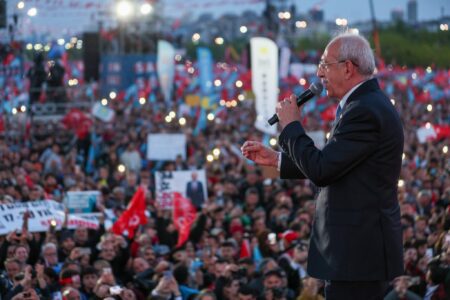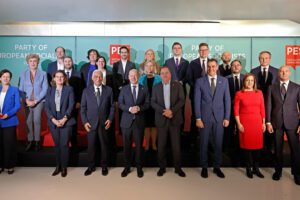The campaign continues and European socialists hope all those demanding change in Türkiye seize the opportunity of the presidential runoff vote to make change happen.
The Party of European Socialists (PES) is thrilled by the excellent result of the democratic opposition in Türkiye at the presidential and general elections held on Sunday. Kemal Kılıçdaroğlu, presidential unity candidate for six opposition parties won 45% of the vote and will go forward to a second-round vote against incumbent president Recep Tayyip Erdoğan, who has been ruling the country for two decades.
Kılıçdaroğlu is the leader of the PES associate member party CHP (Republican People’s Party), which secured 169 out of 600 seats in the Turkish parliament. The united opposition has 213 seats in total, according to 99.8% of the ballots counted.
PES President Stefan Löfven said:
“The outstanding result of Kemal Kılıçdaroğlu and the opposition at the first round of the election is a giant leap towards democracy, human rights, and the rule of law in Türkiye. Erdogan’s authoritarian regime has shifted Türkiye away from its European path but the election on 14 May appear to be a huge chance for positive change.
“European Socialists will strengthen their support for Kemal Kılıçdaroğlu for the second round in two weeks, as he is a beacon of hope for democracy, human rights, freedom, cooperation and bringing Türkiye closer to Europe.”
The other PES associate member party from Türkiye – HDP (Peoples’ Democratic Party) – won 61 seats in the parliament. Because of Erdogan’s authoritarian approach, HDP was forced to run in the election under a different name “The Green Left”, but secured a strong result.
The PES will follow closely all the reports of possible violations in the electoral process during the first round. PES Vice President Andrzej Szejna was among a number of PES representatives who went to Türkiye and observed the election first-hand.
Türkiye’s presidential election this year is decisive for the democratic future of the 85 million Turkish citizens and for the European perspective of the country, which is a prominent NATO member and which in 1987 applied to join what was then the European Economic Community, and in 1999 was declared eligible to join the EU and officially started membership negotiations in 2005.



